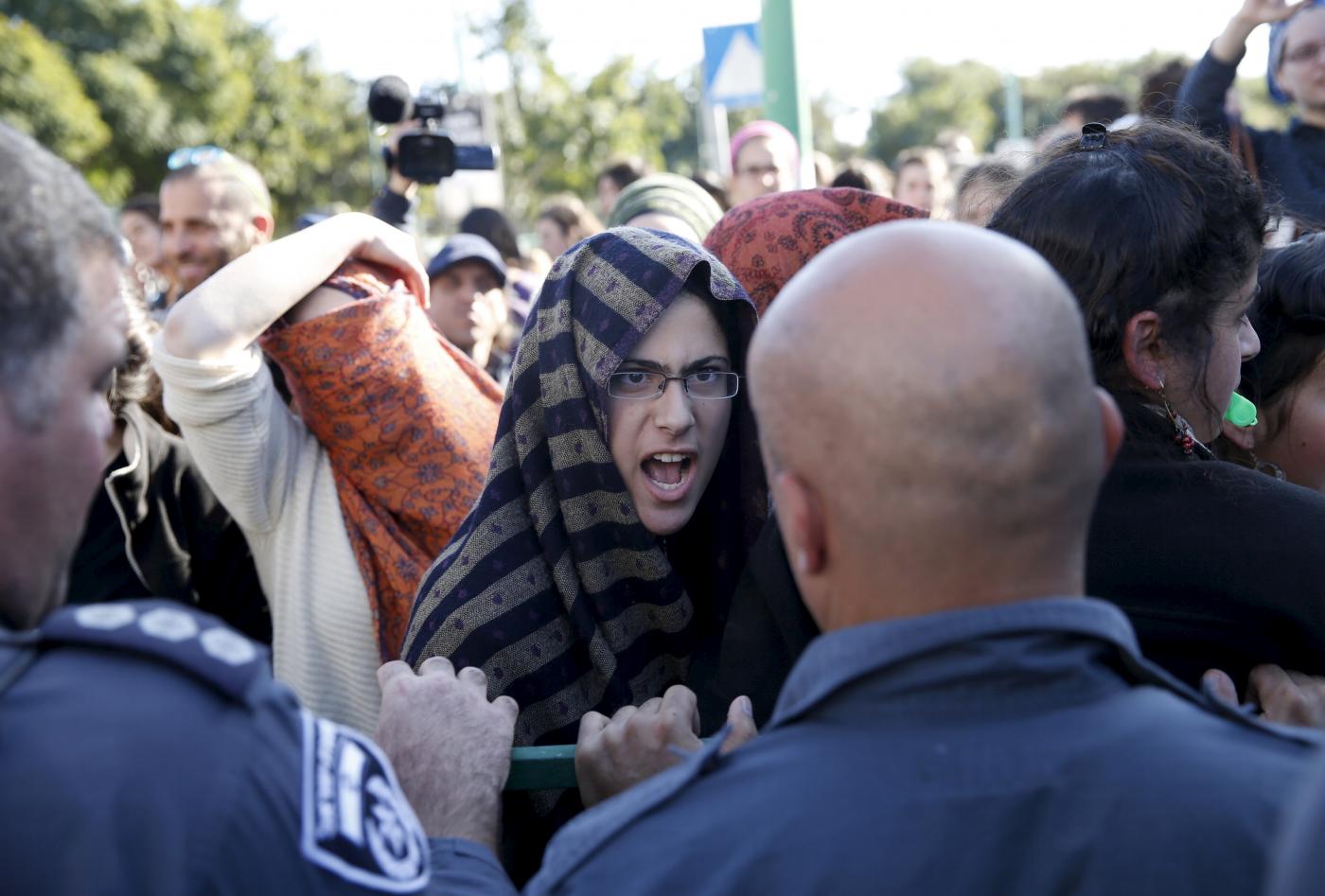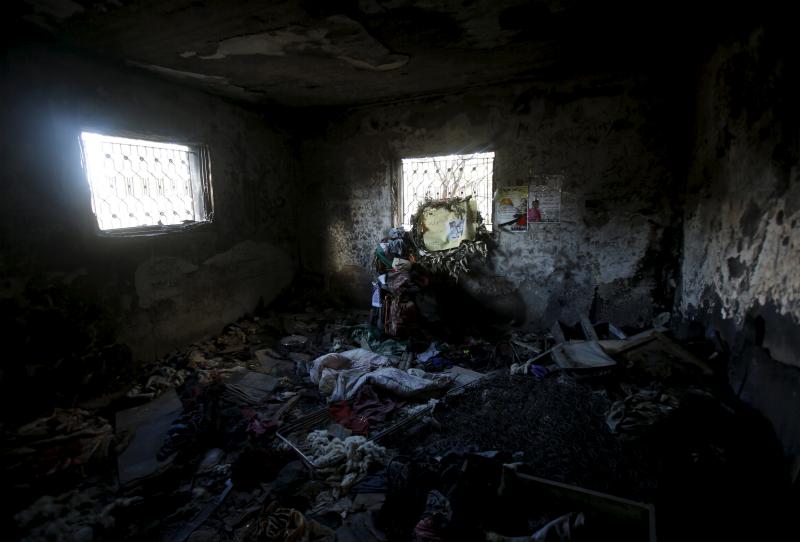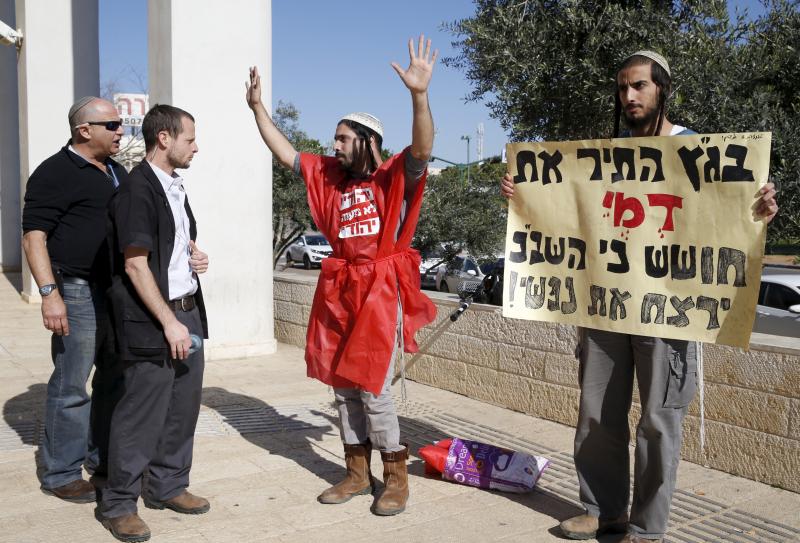PBS: Escaping Eritrea … [Read More...] about ካብ ውሽጢ ቤት ማእሰርታት ኤርትራ
Playing With Fire
The Rise of Jewish Terrorism

On the night of July 30 last year, Amiram Ben-Oliel, the 21-year-old son of a rabbi, waited for a friend in a cave in the heart of the West Bank. They had planned to rendezvous there, between Ramallah and Nablus, before heading to the Palestinian villages of Duma and Majdal Beni Fadal, where they would commit murder. When Ben-Oliel’s friend didn’t show up, he continued alone, setting out on foot for Duma. At the outskirts of the village, according to a summary of the indictment released by Israeli state prosecutors, he wrapped a shirt around his face and put on gloves. Wearing dark clothing, alone in a Palestinian village, he looked for an inhabited home.
The first house he came across belonged to Mamoun Dawabsheh, a father of five and a construction worker who happened to have been in Nablus that night with his wife and children. Ben-Oliel spray-painted the words “Revenge” and “Long live Messiah the King” on the wall, and then threw the first of his two Molotov cocktails inside. The house quickly went up in flames, but it was empty. He then turned to a neighboring home. It belonged to Sa’ad and Riham Dawabsheh, a young couple. The first two windows he tried were firmly shuttered. The third was open. He allegedly lit a Molotov cocktail, threw it in, and took off at a run. The fire killed the two along with Ali, their 18-month-old baby, and badly wounded the lone remaining family member, four-year-old Ahmad Dawabsheh.

The murders were a gruesome moment in the history of Jewish terrorism. But they were not without precedent. In March 1949, before Israel had celebrated its first anniversary, a Jewish gunman, mentally impaired and eager to rebuild the Temple, the holiest site in Judaism, which the Romans destroyed in 70 AD and which lies on the spot where the Dome of the Rock now stands, smuggled a machine gun into the Knesset, Israel’s Parliament, and tried to open fire. The following year, a Jewish group that called itself the Covenant of the Zealots began amassing firearms and explosives and targeting secular institutions. In 1995, a right-wing Jewish extremist gunned down Prime Minister Yitzhak Rabin. The list goes on.
Although not nearly as common or as bloody as Arab terrorist attacks against Jews in Israel, Jewish terrorism has shaped Israeli society, too.
Today’s Jewish terrorists mostly come from the far right like their predecessors, but they differ in their targets and in their ultimate goals. The extreme right in Israel consists of two slightly overlapping but fundamentally different camps: the thugs and the zealots.
The first is primarily concerned with barring intermarriage and preventing the integration of Arabs and Jews, whether in schools or on soccer pitches; many support the soccer team Beitar Jerusalem, which remains the only team in the Israeli Premier League never to have fielded an Arab. This camp is largely based in Jerusalem and the Jewish neighborhoods of Hebron. It includes the political activist Bentzi Gopstein and the members of the far-right group that he heads, Lehava. The second is clustered around the hilltops in the northern part of the West Bank, and its most extreme fringe seeks to rebuild the Temple and impose Jewish law throughout the land. Both camps are capable of murder. But the manner in which they operate is very different.
The murders were a gruesome moment in the history of Jewish terrorism. But they were not without precedent.
In August 2014, Lehava, which Israeli Defense Minister Moshe Ya’alon is reportedly seeking to classify as a terror organization, managed to lead in news broadcasts for a few nights when its members protested outside the hall where a Muslim-Jewish couple from Jaffa was getting married. Earlier this month, a police officer was arrested and charged with providing Lehava with the names and identification numbers of Jewish women who were stopped at routine checkpoints and seen dating Arabs.
During the 50-day war in Gaza in the summer of 2014, after the abduction and murder of three Israeli Jewish teens, it was people from this same camp who ran wild through the streets of Jerusalem one afternoon, accosting Arab pedestrians, and who, several days later, carried out the murder of the 16-year-old Palestinian boy Muhammad Abu Khdeir.
Dvir Kariv, a recently retired 23-year veteran of the unit in the Shin Bet, Israel’s domestic security service, which is devoted to combatting Jewish terror, told me that on July 2, the day after Abu Khdeir’s murder, the profile of the three killers was immediately clear to him. The fact that they were foolish enough to act in an area with surveillance cameras; that they tried earlier to abduct a seven-year-old on July 1 and then tried again the following night in the same place; that they drove an unusual car that stood out; and that after successfully snatching Abu Khdeir they forced benzene down his throat and torched him while still alive: all made it clear that the culprits were not zealots from the West Bank hilltops but thugs.
“Forcing gasoline down someone’s throat is criminal behavior,” Kariv said. “The hilltop people are not criminals. They are ideological criminals. It’s not the same.”
“EXPLOSIVE BARRELS”
Young Jewish settlers first seized a few hilltops in the West Bank during the nineties, in violation of Israeli law but usually with the tacit or active cooperation of the state. Their parents’ generation tended to regard the state of Israel as holy; these new settlers, however, tended to see it as an obstacle to religious redemption.
At first, the hilltop zealots had leaders—men such as Avri Ran, a charismatic former army officer who grew up in a secular household before becoming intensely religious—and rabbis, who provided spiritual guidance and discipline of sorts. Now, 20 years later, a small group has shrugged off its leaders, who often counseled some form of restraint, and seeks not only to harm innocent Palestinians and to deter Arab attacks on settlers but also to overthrow the Israeli government. Ben-Oliel was one of these hilltop zealots.
According to an anonymous manifesto seized by the Shin Bet during the investigation into several attacks carried out by Jewish extremists, “the starting point of the revolt is that the state of Israel has no right to exist.” The end goals are “the amputation of idolatry” in Israel, the construction of a new Temple, the anointing of a king, the expulsion of all non-Jews, and, “as a first step,” the mandatory imposition of Jewish law in the public domain. The state of Israel is vulnerable wherever democracy and Judaism clash, it states, “and what we’ll do is light up every single one of those explosive barrels.”
This explains why they have repeatedly targeted Christian houses of worship, for instance. They consider Catholicism to be idolatrous and therefore a legitimate target, and the freedom of religion that Israel affords its citizenry is one of the “explosive barrels” that they have tried to ignite.
The same goes for the murder of Palestinian civilians: it looks bad for the government and, they hope, it hastens the exodus of non-Jews from the land.
The total number of people who are willing to act upon this ideology is tiny. Kariv, who was the first Shin Bet officer to speak with Rabin’s killer on the night of his death (he has just published a book about the assassination) and who spent the subsequent two decades in the field, said they would “fit on two buses,” and are supported by an additional 500 people.
But the Duma killings were a wake-up call for Israeli law enforcement officials, both because of the ghastly nature of the crime and because the violence would not stop without prosecution. Moreover, it was clear that what starts with violence against Palestinians often spreads to violence against Jews.

And so the Shin Bet took off the gloves. During the investigation into the Duma killings, it sought and received the attorney general’s authorization to use “special measures” in interrogations. In 1999, Israel’s Supreme Court ruled that torture—the binding of prisoners, the denial of sleep, measures akin to waterboarding—were illegal in all circumstances; in the case of a ticking bomb, however, the attorney general might choose not to prosecute a Shin Bet agent who resorted to such means. The Shin Bet has allegedly tortured dozens of Palestinian terror suspects over the years, but never before had it applied these measures to such an extent to Israeli citizens.
Dozens of hilltop dwellers were arrested. In the past, they had simply remained silent throughout their interrogations. The scenes of arson or graffiti in Palestinian areas were often depleted of forensic evidence, and the suspects, even if good intelligence suggested that they were the perpetrators, were often freed for lack of evidence. This time they were coerced. Ben-Oliel, along with his absent accomplice, confessed, and Ben-Oliel reenacted the crime. The extent to which his confession was forced will be at the center of his upcoming trial.
“A WAR OF GOG AND MAGOG”
The Shin Bet unit that deals with Jewish terror is small. In the early eighties, a former Shin Bet chief wrote in his memoir that the entire unit could fit around a table with four chairs, including the commander’s secretary. Today, it is bigger but still overworked, especially given the importance of its two central missions: protecting the Islamic holy sites on the Temple Mount from an attack that could precipitate a regional war and protecting the Israeli prime minister. Kariv revealed that each time a commander leaves the unit he tells his replacement in a ceremony: I pass on to you a living prime minister and an intact Temple Mount.
Today, with little in the way of territorial concession on the horizon and the preservation of the status quo as his ethos, Prime Minister Benjamin Netanyahu is in relatively little danger. The same is not true of the Temple Mount nor the justices of the Supreme Court, whom the far right increasingly sees as obstacles on the path toward redemption.
“The starting point of the revolt is that the state of Israel has no right to exist.”
Another political murder by the zealots would be a devastating blow to Israeli democracy, Kariv said. Damage to the Temple Mount could trigger regional war. Hence the unprecedented treatment of the suspects by the Shin Bet.
